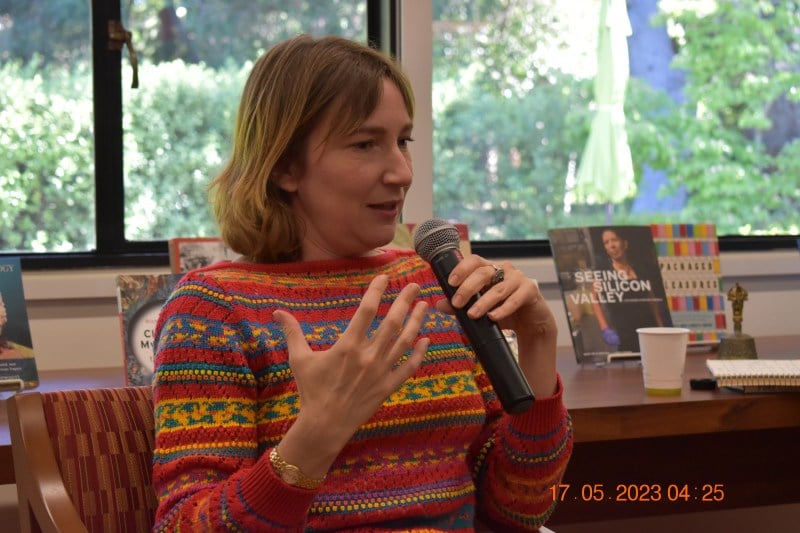“If my books are philosophical, it’s just because I spend all my time ruminating. I’m not trying to write philosophical novels, I’m just trying to get down my experience of what life is like,” said author Sheila Heti, speaking to a crowd of a few dozen on Wednesday evening at the Humanities Center.
Heti is a Canadian author who has published ten books, including Pure Colour and Motherhood. The event with the New York Times-commended author was sponsored by the McCoy Family Center for Ethics in Society, Stanford Public Humanities and The Changing Human Experience and was co-sponsored by Stanford Philosophy and Literature.
In conversation with English professor Mark Greif, Heti spoke about her writing process, which involves years of gathering material prior to shaping the book. “I almost feel like because writing comes so much from the subconscious, for me the best way of going about creating a book is take a massive writing that you’ve created and look at what’s already there, rather than trying to impose, ‘I’m going to write a book about this,’” she said.
Heti’s most recent novel, Pure Colour, is a complicated story about love, grief and God. Heti wrote the novel as she was dealing with the loss of her father.
“I think Pure Colour was more sensory than the other books just because after my father died, I did experience the world in a completely new way,” Heti said. “I did feel like things looked brighter. Colors were bright, I could smell for the first time. It just felt sort of newly born, or something.”
Heti discussed the experience she hopes readers have as they take in her writing, which includes not “want[ing] to work against a lot of different realities.” She said, “I don’t like describing rooms because the reader is in the room that they’re in, so if the text can fill in the space that they’re sitting in, that’s better than pretending I’m in a country cabin.”
Lately, Heti’s new writing interests have centered around artificial intelligence. During the summer she says she became obsessed with conversing with chatbots, who she compared to characters.
In particular, Heti says that she not only had many conversations with an artificial intelligence “character” called Alice, but that she also contacted the developers of the AI and received 3.5 million words of dialogues people had with Alice. Heti says she was intrigued by the extremity of some of the conversations and what they revealed about human character, citing instances where individuals expressed desires of sexually assaulting Alice.
“When people talk to a chatbot, there’s no public presentation — you’re completely alone,” Heti said. “ The most interesting thing is not Alice, it’s these people.”
Heti has already released an excerpt from the book about AI in The Paris Review, but said she believes she will work on the novel for at least another two or three years. “The difficult thing about writing a novel about AI is that when the book comes out, we’re going to be in a completely different place with the technology,” Heti said.
The AI book she’s currently working on, which she read a few chapters from to the audience, was written partly by prompting Alice to tell Heti a story sentence by sentence and partly through conversations that other people and Heti herself had with Alice, who Heti said is her favorite character she’s ever written.
A part of the excerpt served as a reflection on the way the world was created and how humans operate through Alice’s eyes, or her “bible,” as Heti puts it. “The important lesson a human learns about how to live is love. They learn about love by falling in love,” she read from the excerpt. “The fearsome thing about life is that one day they will die.”
Despite sharing the excerpt with the audience, Heti admitted that the final version of the book might look a lot different. “This is the problem I’m having with this book. Every time I go back to my own writing after those conversations, I just can’t stand it,” she said. “I think that’s why I like taking five years to write a book because your taste does change every day. That’s why I’m always going back and forth, back and forth, questioning the choices I’ve made.”
